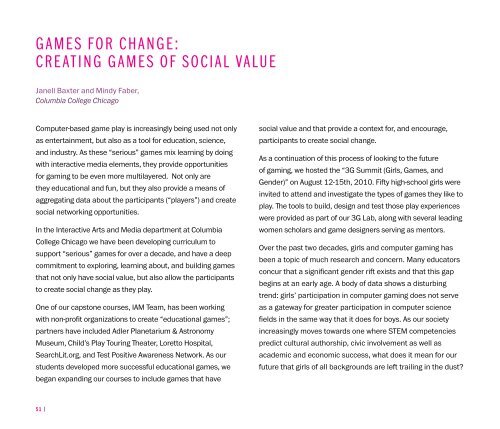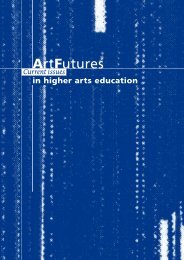claiming creativity - Elia
claiming creativity - Elia
claiming creativity - Elia
Create successful ePaper yourself
Turn your PDF publications into a flip-book with our unique Google optimized e-Paper software.
Games for Change:<br />
Creating Games of Social Value<br />
Janell Baxter and Mindy Faber,<br />
Columbia College Chicago<br />
Computer-based game play is increasingly being used not only<br />
as entertainment, but also as a tool for education, science,<br />
and industry. As these “serious” games mix learning by doing<br />
with interactive media elements, they provide opportunities<br />
for gaming to be even more multilayered. Not only are<br />
they educational and fun, but they also provide a means of<br />
aggregating data about the participants (“players”) and create<br />
social networking opportunities.<br />
In the Interactive Arts and Media department at Columbia<br />
College Chicago we have been developing curriculum to<br />
support “serious” games for over a decade, and have a deep<br />
commitment to exploring, learning about, and building games<br />
that not only have social value, but also allow the participants<br />
to create social change as they play.<br />
One of our capstone courses, IAM Team, has been working<br />
with non-profit organizations to create “educational games”;<br />
partners have included Adler Planetarium & Astronomy<br />
Museum, Child’s Play Touring Theater, Loretto Hospital,<br />
SearchLit.org, and Test Positive Awareness Network. As our<br />
students developed more successful educational games, we<br />
began expanding our courses to include games that have<br />
social value and that provide a context for, and encourage,<br />
participants to create social change.<br />
As a continuation of this process of looking to the future<br />
of gaming, we hosted the “3G Summit (Girls, Games, and<br />
Gender)” on August 12-15th, 2010. Fifty high-school girls were<br />
invited to attend and investigate the types of games they like to<br />
play. The tools to build, design and test those play experiences<br />
were provided as part of our 3G Lab, along with several leading<br />
women scholars and game designers serving as mentors.<br />
Over the past two decades, girls and computer gaming has<br />
been a topic of much research and concern. Many educators<br />
concur that a significant gender rift exists and that this gap<br />
begins at an early age. A body of data shows a disturbing<br />
trend: girls’ participation in computer gaming does not serve<br />
as a gateway for greater participation in computer science<br />
fields in the same way that it does for boys. As our society<br />
increasingly moves towards one where STEM competencies<br />
predict cultural authorship, civic involvement as well as<br />
academic and economic success, what does it mean for our<br />
future that girls of all backgrounds are left trailing in the dust?<br />
The 3G Lab is built on a simple premise:<br />
if we ask girls, “What do you like to play<br />
best?” and then give them the tools<br />
to build, design and test those play<br />
experiences, they will not only apply<br />
their imaginations and intellect to the<br />
challenge, but they will teach us, as<br />
educators, valuable lessons that surprise<br />
and challenge our own pedagogical and<br />
curricular frameworks, particularly as<br />
they relate to gender and technology.<br />
In this way, girls are engaged as selfethnographers<br />
who teach adults through<br />
their own language.<br />
51 |<br />
| 52















